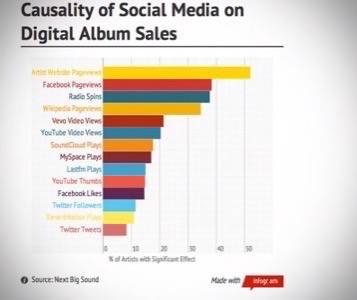
For some musicians, social media is a pain. They’d much rather focus on writing and performing songs than tweeting, pinning and Instagramming from the tour bus. Does all that time spent on digital promotion even pay off? New research suggests that yes, it does.
There’s actually a correlation between an artist’s social media presence and their album sales, according to data from Next Big Sound. For 38% of musicians, Facebook views had a significant effect on album sales, a stronger impact than traditional radio plays had. Vevo, YouTube and SoundCloud all ranked highly as well.

It’s not just social media that’s driving paid downloads. The artist’s own website still has substantial impact on boosting sales, more than any other channel examined. For 52% of artists, more website page views meant more digital album sales. A few more (54%) saw the same cause-and-effect relationship when it came to selling digital singles.
On Facebook, it’s not just about building up a large fan base. Artists, like other brands, have to actively engage fans there, as evidenced by the fact that Facebook page views had a much higher correlation with album sales than did Facebook Likes. In other words, it’s not enough to just be there. Bands have to continually post updates and interact with their fans.
The Future Of Music Is… Wikipedia??
Perhaps the most interesting data point is the relationship between music sales and Wikipedia. Apparently, the more well-trafficked an artist’s Wikipedia entry is, the more likely they are to sell digital music. That might seem pretty weird, but maybe what’s happening is that fans want to know more about an artist before buying their music. Or perhaps the intent to purchase was already there; People are just looking for historical information about their favorite artists, whose music they’re already likely to purchase.
The charts illustrate, among other things, MySpace‘s dwindling relevance. MySpace plays drove album sales for only 17% of bands. When it came to driving digital single sales, MySpace was at the bottom of the list. This is obviously something the company desperately hopes to change with its latest relaunch.
Noticeably absent from this analysis was Spotify. With all the hullabaloo over artist royalties and streaming services, many in the industry are anxious to see what, if any, relationship there is between Spotify exposure and sales. Its chief competitor, Rdio helped drive digital single sales for 17% of artists studied.
Lessons For The Music Industry
Finally, it’s worth noting that terrestrial radio is far from dead. Even in the face of competition from the likes of Pandora, Last.fm and Spotify, radio plays are still a significant driver of paid music sales, just like in the old days.
If there’s a key takeaway for the music industry, it’s that maintaining an active Web presence and utilizing social media are every bit as valuable to the business of music as everybody thought. That’s not breaking news, but it’s always nice to have some hard data to back up assumptions. For independent artists, it suggests that Twitter and Facebook aren’t a waste of time after all. Oh, and you might want to double-check that your Wikipedia entry is up-to-date.
Lead photo by Alexandre Normand.

















